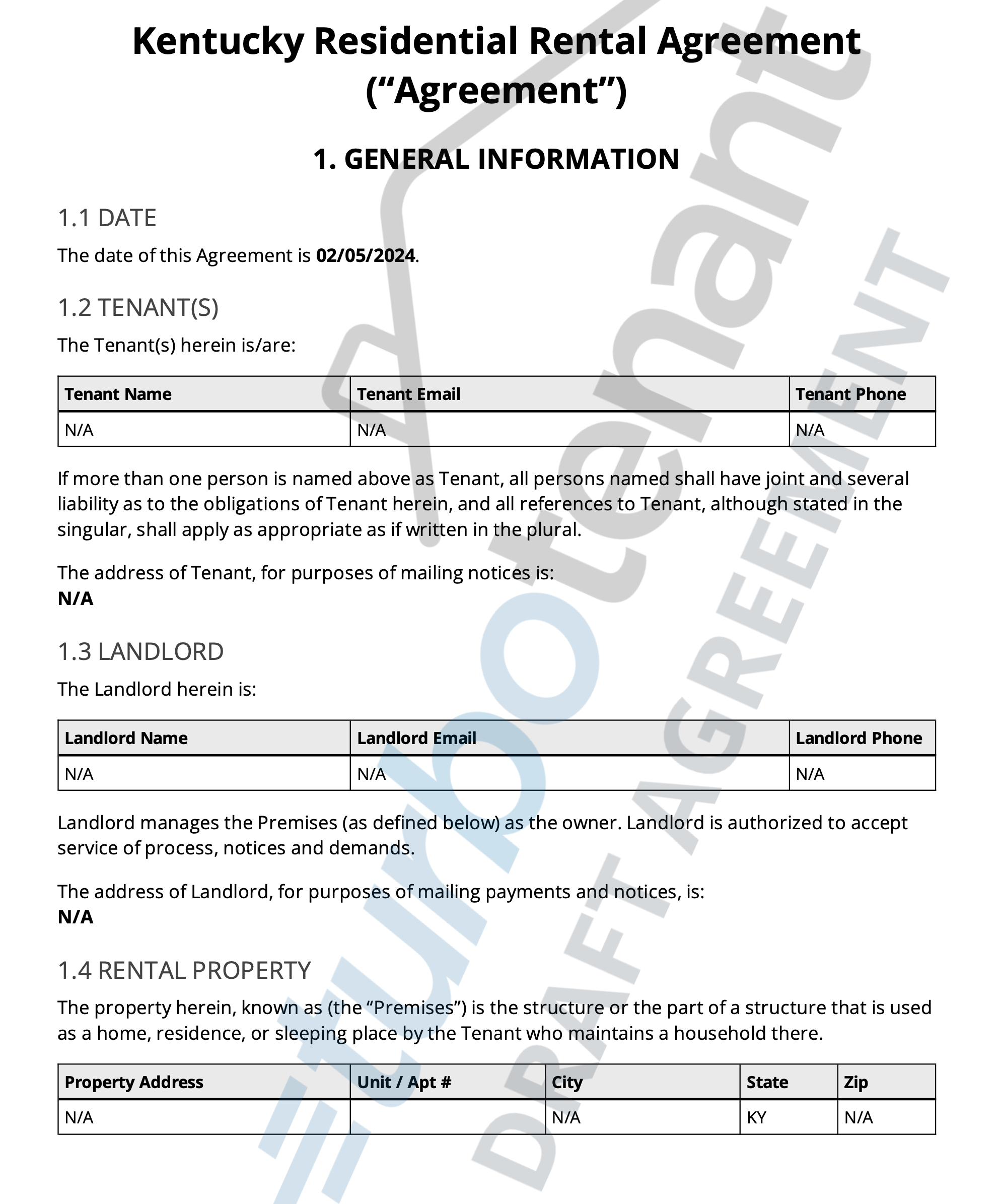
Kentucky lease agreements are legally binding documents that outline the terms and conditions under which a rental property is leased by the landlord to the tenant. Understanding the specific requirements and provisions of Kentucky law is essential for both landlords and tenants to ensure a smooth rental experience. TurboTenant’s Kentucky Lease Agreement Generator and Templates offer a comprehensive solution for creating personalized, legally compliant lease agreements tailored to the unique needs of Kentucky landlords and tenants.
Section 1 – Custom to You
In Kentucky, lease agreements start with the customization of essential details specific to the rental arrangement. This includes identifying the parties involved, setting the rent amount, defining utilities responsibilities, and any other relevant information.
Highlights of Customizable Features
- Additional Provisions: Landlords have the opportunity to include property-specific rules or necessary local clauses to cater to unique rental situations, with the recommendation to review these additional provisions with a lawyer for compliance.
- Lost Key Policy: Specifies the tenant’s requirement to bear the full cost of rekeying the property if all keys are not returned upon moving out.
Section 2 – Specific to Kentucky
This section incorporates clauses that are specifically relevant to Kentucky’s rental laws, ensuring compliance and understanding of local legal requirements.
Key Kentucky Regulations
- Late Fees (Section 2.1): Kentucky allows the charging of a late fee of $20 or 20%, whichever is greater, of the unpaid rent if not received by the fifth day of each month. These fees are considered additional rent and are collected as such.
- Security Deposit Provisions (Section 2.4): Kentucky does not have a statutory minimum deposit amount, with typical deposits ranging from 1–2 times the monthly rent. Security deposits must be held in a separate account, with specific rules governing the return of the deposit.
- Condition of Premises (Section 2.6): Tenants acknowledge the property’s condition prior to occupancy and accept the premises “As Is”. Any defects or damages must be documented in the Property Condition Report.
- Entry/Access to Premises by Landlord (Section 2.8): Landlords have the right to enter the premises for inspections or showings, with efforts made to notify tenants at least two days in advance in non-emergency situations.
Section 3 – General Clauses for Best Practices
This section includes standard clauses common in lease agreements across the U.S., emphasizing best practices in the landlord-tenant relationship.
Important General Clauses
- Subletting (Section 3.1): Tenants are not allowed to sublease the property without written permission from the landlord.
- Altering or Improving the Property (Section 3.2): Any alterations or improvements, such as repainting, require the landlord’s written consent.
- Mold and Mildew Disclosure (Section 3.4): Landlords and tenants must inspect the premises for visible mold or mildew before the lease commences, with tenants responsible for maintaining conditions that minimize mold growth.
- Choice of Law (Section 3.11): The lease agreement is governed by Kentucky laws, and disputes are to be resolved in the county courts where the property is located.

FAQ
What are the late fee regulations in Kentucky?
Kentucky permits a late fee of $20 or 20%, whichever is greater, of the unpaid rent amount if payment is not received by the fifth day of each month.
How should security deposits be handled in Kentucky?
Security deposits in Kentucky should range from 1–2 times the monthly rent and be held in a separate account. Specific rules apply to the return of the deposit, depending on whether rent or other charges are owed at lease termination.
What is required for property condition acknowledgment in Kentucky?
Tenants must acknowledge the property’s condition before occupancy, noting any defects or damages in the Property Condition Report. The premises are accepted “As Is”, and any additional conditions must be documented.
Can Kentucky landlords enter rental properties for inspections or showings?
Yes, Kentucky landlords have the right to enter the premises for inspections or showings, making a good faith effort to notify tenants in advance, except in emergencies or when repairs are requested by the tenant.
TurboTenant Kentucky Lease Agreements
TurboTenant’s Kentucky Lease Agreement Generator and Templates simplify the process of creating customized, legally compliant lease agreements for landlords in Kentucky. These tools ensure that all specific legal requirements and best practices are incorporated into the lease, providing peace of mind and legal protection for both landlords and tenants. For additional provisions or unique rental situations, consulting with a legal professional is recommended to ensure compliance with Kentucky law.
Kentucky Resources


